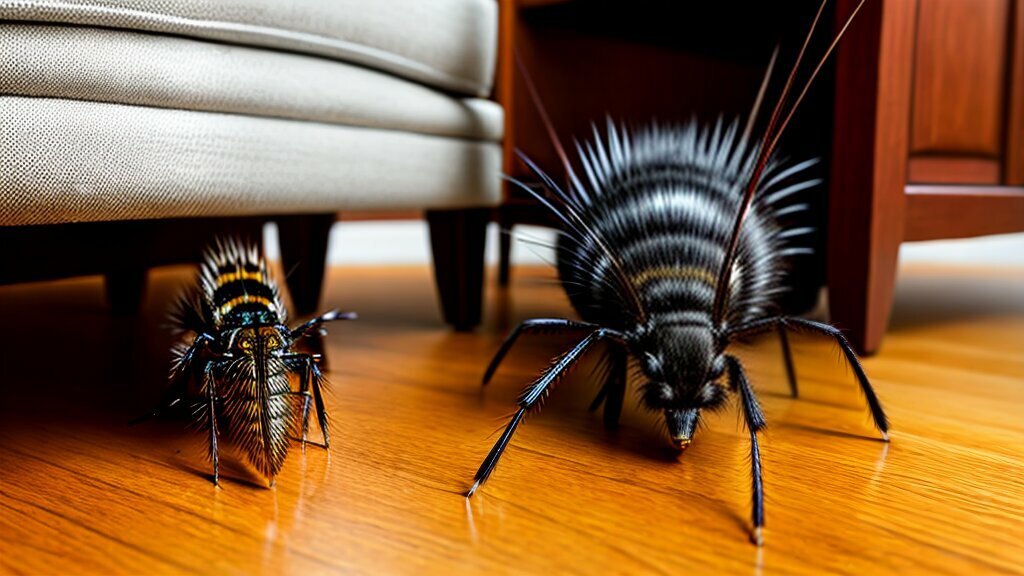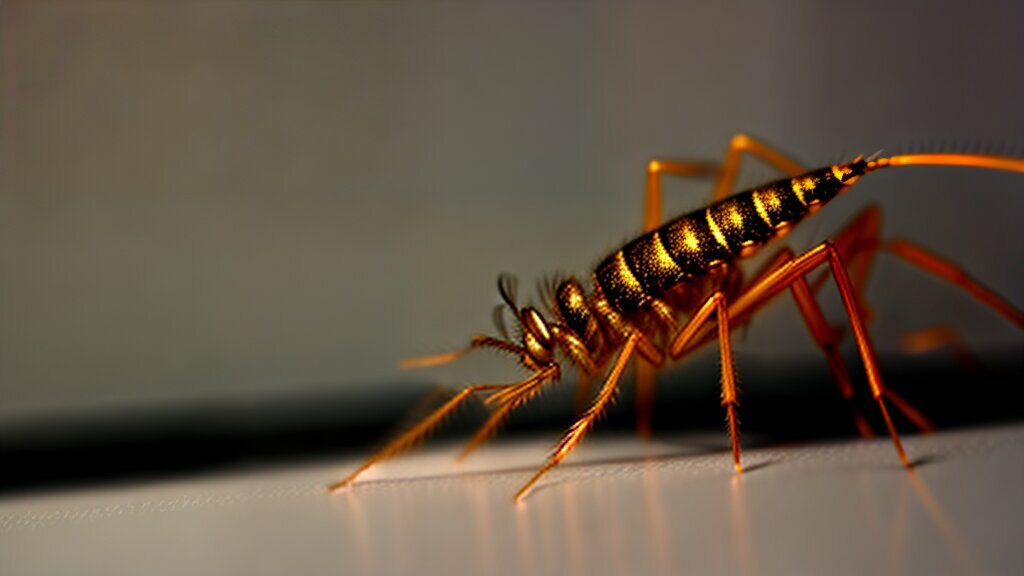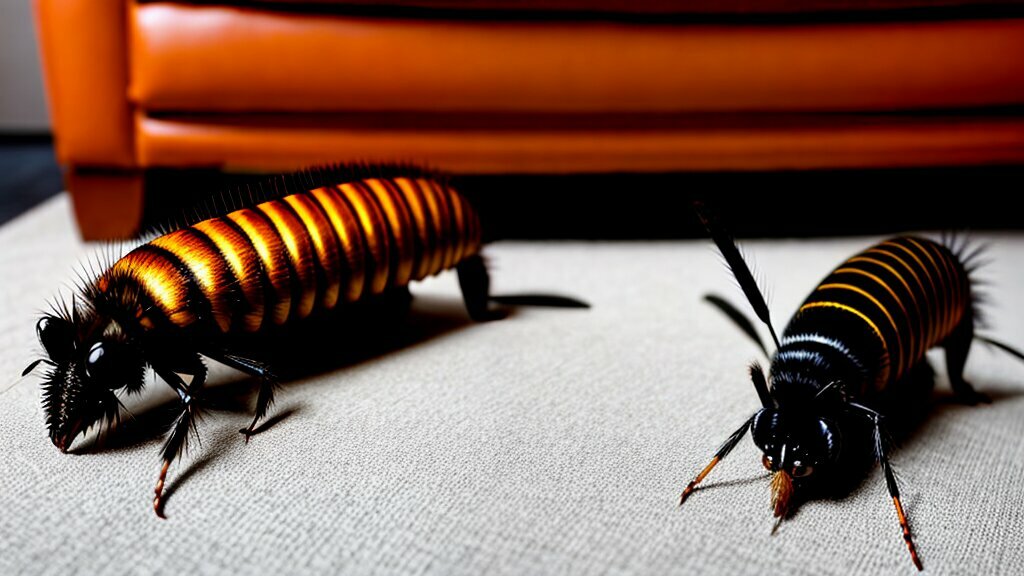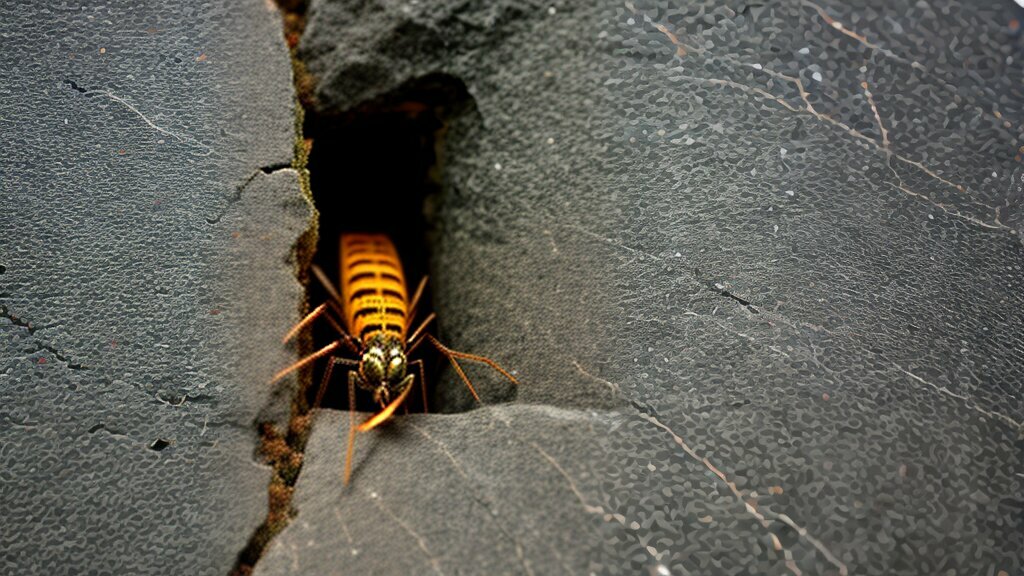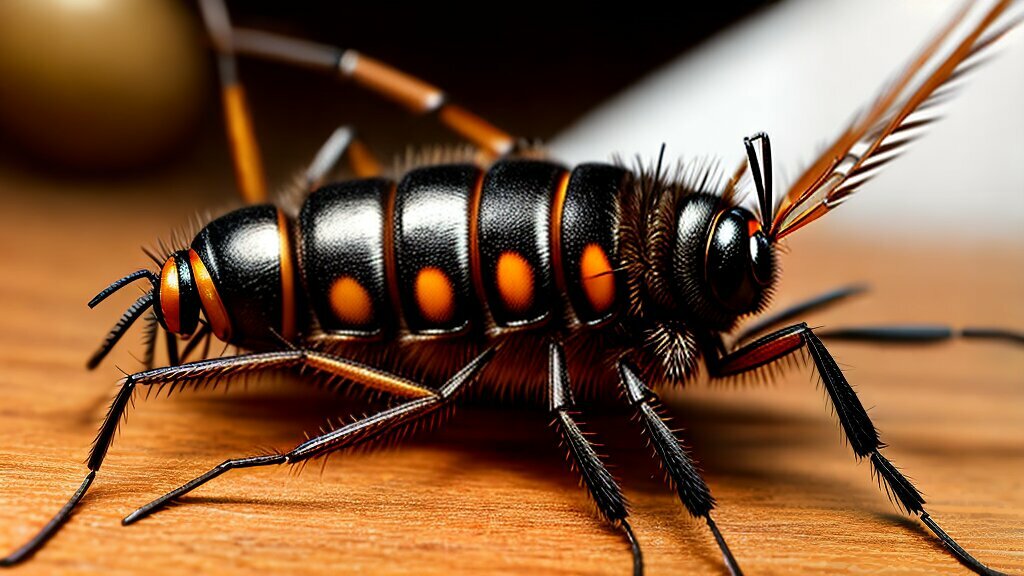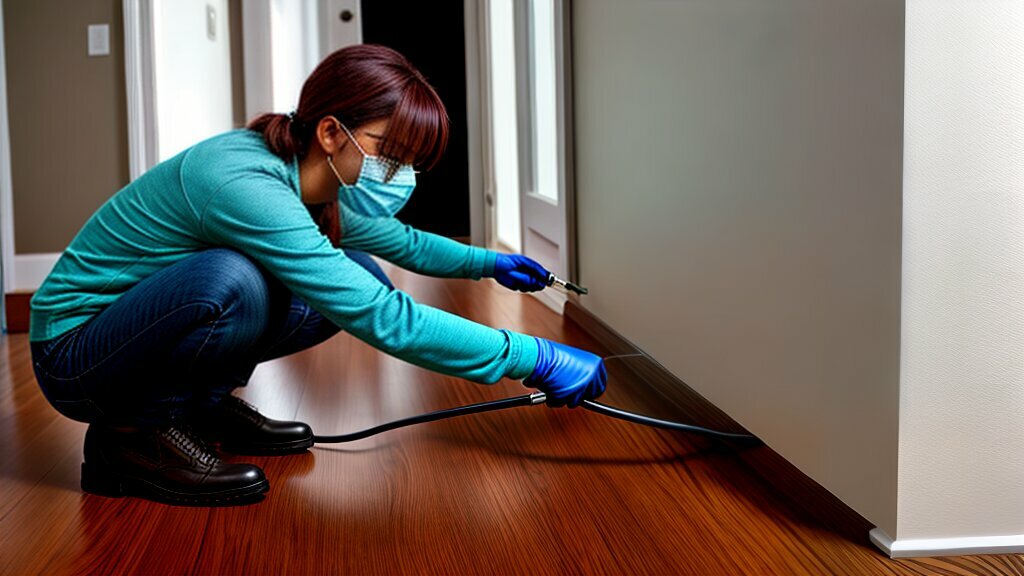House centipedes are common household pests that can be unsettling to encounter. Their long, slender bodies and numerous legs give them an alien-like appearance that often prompts fear and disgust in humans. But what is the truth about house centipedes’ behavior around humans? Do they avoid us, or are they simply lurking in the shadows, waiting to pounce? In this article, we’ll explore the fascinating world of house centipedes and provide insights into their behavior, avoidance mechanisms, and potential danger to humans.
Key Takeaways:
- House centipedes are common household pests that can be unsettling to encounter.
- Despite their appearance, house centipedes are harmless to humans and can actually be beneficial as they prey on other insects.
- House centipedes prefer to dwell in dark, damp areas, such as basements and bathrooms, and are attracted to moisture and clutter.
- There are several natural remedies and methods that can be used to repel house centipedes, as well as practical tips for preventing them from entering your home.
- If an infestation has occurred, there are several methods for getting rid of house centipedes, including using insecticides, traps, and calling professional pest control.
Understanding House Centipede Behavior
House centipedes are small, wingless arthropods that have long, slender, and segmented bodies. They have a total of 15 pairs of legs, which makes them one of the fastest moving creatures in the world. House centipedes are nocturnal creatures that are mainly active during the night, and they can be found in dark and damp locations.
House centipedes are commonly found in basements, bathrooms, and other areas of the house that are rich in moisture. They are also attracted to areas where there are insects present, as they feed on spiders, roaches, and other small insects.
Despite their creepy appearance, house centipedes are generally harmless to humans. They do not bite or sting, and they are not known to transmit any diseases. However, their presence can be unsettling to some people, especially those who have a fear of insects. In this section, we will explore the behavior of house centipedes and how they interact with humans.
Natural instincts of house centipedes
House centipedes have natural instincts that drive their behavior. One of these instincts is their avoidance of humans. House centipedes prefer to avoid contact with humans and will typically hide when they sense human activity.
Another instinct of house centipedes is their preference for dark and damp environments. They are commonly found in basements, bathrooms, and other areas of the house that are rich in moisture. House centipedes are also sensitive to light and vibration, which can cause them to move to another location if they feel threatened.
House centipedes are fast-moving creatures that can run up walls and across ceilings with ease. They are also excellent hunters, using their long legs to quickly catch their prey. House centipedes typically feed on spiders, roaches, and other small insects.
Overall, understanding the behavior of house centipedes can help homeowners identify the signs of an infestation and take appropriate action to prevent them from entering their homes. The next section will explore the reasons behind house centipedes’ avoidance of humans.
House Centipedes’ Avoidance Mechanisms
House centipedes are known to avoid humans and prefer to dwell in dark, damp areas such as basements, bathrooms, and crawl spaces. They tend to avoid areas with high human traffic and activity. This behavior can be attributed to their natural instinct to avoid potential threats and predators.
One of the main factors that contribute to their avoidance of humans is their sensitivity to light. House centipedes are nocturnal creatures and prefer dark environments. Exposure to bright light can disorient and stress them, causing them to scurry away into hiding places.
Another factor is their sensitivity to vibrations. House centipedes can detect vibrations from movement and sound, which alerts them to potential danger. This is why they tend to avoid areas with high activity or noise, such as busy households.
Additionally, house centipedes prefer to dwell in areas with high humidity levels and moisture. These areas provide a suitable habitat and a source of food for them. As such, they tend to avoid dry and arid environments.
Overall, house centipedes’ avoidance mechanisms are a result of their natural instincts and preferences. Understanding these mechanisms can help homeowners prevent infestations and coexist peacefully with these creatures.
Signs of House Centipede Infestation
If you suspect that you have a house centipede infestation, there are several signs you can look out for.
| Signs of Infestation | Description |
|---|---|
| Live Centipedes | Finding live centipedes in your home, especially in areas with high moisture such as bathrooms or basements. |
| Shed Skin | House centipedes shed their skin as they grow, so finding discarded skin around your home is a sign of their presence. |
| Presence of Other Insects | House centipedes feed on other insects, so if you notice an increase in the number of other pests in your home, it may be a sign of a house centipede infestation. |
| Unusual Odor | House centipedes emit an unpleasant odor when they feel threatened, so if you notice a strange smell in your home, it could be a sign of their presence. |
If you notice any of these signs, it’s important to take action as soon as possible to prevent the infestation from spreading.
Are House Centipedes Dangerous to Humans?
One of the biggest concerns people have when dealing with house centipedes is whether they pose a danger to humans. While they can look intimidating with their numerous legs and fast movements, house centipedes are generally harmless to humans.
House centipedes do possess venom and can use it to immobilize their prey. However, their venom is not dangerous to humans and generally only causes mild irritation and swelling. In rare cases, some people may experience an allergic reaction to their bite, but this is extremely rare.
It’s also important to note that house centipedes are not aggressive towards humans and will only bite if they feel threatened or cornered. As such, it’s recommended to avoid handling them and to instead call a professional to handle any infestations.
Image source:
Preventing House Centipedes from Entering Your Home
Although house centipedes are not harmful to humans, their presence can be undesirable. To prevent them from entering your home, there are several practical steps you can take:
| Step | Description |
|---|---|
| Seal cracks and crevices | House centipedes can enter your home through tiny cracks and gaps. Seal up any holes or gaps in walls, windows, and doors with caulk or weatherstripping to prevent their entry. Additionally, ensure that your window screens are intact and without holes. |
| Keep your home dry | House centipedes thrive in damp environments, so it’s essential to minimize moisture inside your home. Fix any leaks and keep areas like basements, crawl spaces and attics dry and well-ventilated. |
| Eliminate clutter | Clutter provides ample hiding spaces for house centipedes. Keep your home tidy and free of excess items that could serve as hiding spots for the critters. |
| Keep food covered and sealed | House centipedes are attracted to food remnants and crumbs. Be sure to keep all food stored in airtight containers and clean up spills promptly. Do not leave piles of dirty dishes or food scraps lying around. |
| Use essential oils | House centipedes dislike certain scents, including peppermint, tea tree oil, and lavender. Sprinkle a few drops of these essential oils around the perimeter of your home or in areas where you’ve noticed centipedes. Alternatively, you can use a diffuser to spread these scents throughout your home. |
By taking these preventative steps and utilizing natural repellents, you can effectively deter house centipedes from entering your home. If your centipede infestation continues despite your efforts, it may be time to call in a professional pest control service.
Natural Ways to Repel House Centipedes
If you’re looking for natural and non-toxic ways to repel house centipedes, you’re in luck. There are several remedies that you can use to keep these creepy crawlers at bay.
Essential Oils
One of the most effective natural remedies for repelling house centipedes is essential oils. These oils work by disrupting the centipedes’ ability to smell and navigate, making your home less appealing to them.
Peppermint oil is particularly effective at repelling house centipedes due to its strong scent and antifungal properties. Simply mix a few drops of peppermint oil with water in a spray bottle and apply the solution to all areas of your home where centipedes are likely to enter.
Vinegar
Vinegar is another effective natural remedy for repelling house centipedes. The acetic acid in vinegar disrupts the centipedes’ sense of smell and makes your home less attractive to them.
To use vinegar as a natural repellent, simply mix equal parts of vinegar and water in a spray bottle and apply the solution to all areas of your home where centipedes are likely to enter.
Diatomaceous Earth
Diatomaceous earth is a natural and non-toxic substance that can be used to repel and kill house centipedes. This powdery substance works by dehydrating the centipedes’ exoskeleton and killing them.
To use diatomaceous earth as a repellent, simply sprinkle a thin layer of the powder in all areas of your home where centipedes are likely to enter, such as around baseboards, windows, and doorways.
Cleanliness
One of the simplest ways to repel house centipedes is to maintain a clean and clutter-free home. House centipedes are attracted to dark and damp environments, so it’s important to eliminate excess moisture and reduce clutter in your home.
Regularly vacuuming and sweeping your floors, wiping down surfaces with disinfectant, and fixing any leaks or water damage can go a long way in preventing centipedes from infesting your home.
Getting Rid of House Centipedes
If you have discovered a house centipede infestation, it’s time to take action. Here are some effective tips and strategies for getting rid of these pests:
1. Use Insecticides
One effective way to get rid of house centipedes is by using insecticides. Apply insecticide sprays or dusts to areas where you have seen centipedes, such as cracks and crevices, baseboards, and other dark and damp areas. Make sure to follow the instructions carefully and wear protective gear when handling insecticides.
2. Set Traps
You can also use sticky traps to catch centipedes. Place these traps in areas where you have seen centipedes, such as under sinks, near drains, and along baseboards. Check the traps regularly and dispose of them once they have caught the centipedes.
3. Call Professional Pest Control
If you have a severe infestation or if the above methods are not effective, it may be time to call in professional pest control services. They have the expertise and equipment to handle the situation and ensure that your home is free of centipedes.
Remember, prevention is key to avoiding future infestations. Keep your home clean and dry, seal up any cracks and gaps, and eliminate clutter to reduce hiding spots for centipedes. By taking these steps, you can ensure that your home remains centipede-free!
Home Remedies to Keep House Centipedes Away
If you want to keep house centipedes away from your home, there are several natural and DIY remedies that you can try. While some of these methods may not be as effective as professional pest control, they can be a useful way to deter centipedes from entering your home.
1. Seal Cracks and Crevices
Centipedes can easily enter your home through small cracks and crevices in your walls or foundation. Sealing these gaps with caulk or foam can prevent centipedes from entering your home. Focus especially on areas where pipes, wires, or cable TV lines come through walls, floors, and ceilings since these areas tend to have the widest gaps.
2. Reduce Moisture
Centipedes thrive in damp environments, so reducing moisture in your home can help keep them away. Fixing leaks, using a dehumidifier, and ensuring good ventilation in bathrooms and basements can help reduce moisture levels and discourage centipedes from inhabiting your home.
3. Keep Your Home Clean
A clean home is less attractive to centipedes since they prefer cluttered, messy environments. Vacuum regularly, dust frequently, and avoid leaving water or food out for extended periods. This will make your home less inviting to centipedes.
4. Use Essential Oils
Many essential oils are believed to act as natural insect repellents. Peppermint oil, eucalyptus oil, and tea tree oil are particularly effective against centipedes. Simply dilute a few drops of oil in water and spray the mixture around entry points, windowsills, and baseboards to help keep centipedes away.
5. Diatomaceous Earth
Diatomaceous earth is a natural substance that can be used to repel centipedes. It works by dehydrating centipedes and other insects, ultimately killing them. Sprinkle diatomaceous earth around areas where centipedes might enter your home, such as near doors and windows, and around the perimeter of your home.
6. Use Sticky Traps
Sticky traps can be an effective way to catch and remove centipedes from your home. Simply place the trap near suspected entry points and wait for the centipedes to get stuck on the adhesive. Dispose of the trap and centipedes in the trash.
- While these home remedies may help keep centipedes away from your home, they may not be enough to completely eliminate an infestation. If you have a severe infestation or are unsure how to deal with centipedes, it is best to contact a professional pest control service.
Conclusion
In conclusion, house centipedes are naturally inclined to avoid human interaction. However, they may enter and dwell in areas where humans reside, especially if the conditions are suitable for their survival. Understanding their behavior and avoidance mechanisms can help homeowners identify and prevent infestations.
If an infestation has occurred, there are several ways to get rid of house centipedes. From natural remedies to calling in professional pest control, homeowners have a range of options to choose from. It’s important to remember that prevention is key, and maintaining a clean and clutter-free environment is the best way to keep house centipedes at bay.
We hope that this article has provided valuable insights and information about house centipedes and their behavior around humans. By following the tips and strategies outlined in this article, homeowners can minimize the risk of a house centipede infestation and ensure a pest-free home.
FAQ
Q: Do house centipedes avoid humans?
A: House centipedes typically try to avoid human interaction. They prefer dark and damp areas and are more active during the night, seeking out smaller insects for food. While they may occasionally be seen in homes, they generally try to avoid direct contact with humans.
Q: Understanding house centipede behavior
A: House centipedes have natural instincts that guide their behavior around humans. They prefer to remain hidden in cracks, crevices, and other dark areas, which helps them avoid direct contact. They may also be sensitive to vibrations and light, further influencing their behavior around humans.
Q: House centipedes’ avoidance mechanisms
A: House centipedes tend to avoid humans due to various factors. They are sensitive to light and may seek out darker areas to avoid exposure. They can also detect vibrations, which may cause them to retreat to safer locations. Additionally, their preference for damp environments makes them less likely to seek out human dwellings.
Q: Signs of house centipede infestation
A: Signs of a house centipede infestation may include the sight of live centipedes, shed exoskeletons, and the presence of their prey, such as small insects. You may also notice a musty odor in areas where they are present. If you suspect an infestation, a professional pest control expert can help confirm and address the issue.
Q: Are house centipedes dangerous to humans?
A: While house centipedes are not typically aggressive towards humans, they do possess venomous jaws that they use to hunt their prey. Bites are rare, and even if bitten, the venom usually causes only mild discomfort. However, individuals with allergies or sensitivities may experience a stronger reaction and should seek medical attention if necessary.
Q: Preventing house centipedes from entering your home
A: To prevent house centipedes from entering your home, it is important to seal cracks and crevices in walls, windows, and doors. Keeping the home clean and reducing moisture levels can also help deter them. Additionally, eliminating clutter and maintaining a well-ventilated environment can make your home less attractive to these pests.
Q: Natural ways to repel house centipedes
A: There are several natural remedies that can help repel house centipedes. Using essential oils such as peppermint, lavender, or citrus can be effective, as centipedes dislike their strong scent. Diatomaceous earth, a non-toxic powder, can also deter them. Regular cleaning practices and minimizing food sources can further discourage their presence.
Q: Getting rid of house centipedes
A: If you have an infestation of house centipedes, there are several methods to get rid of them. Using insecticides specifically designed for centipedes can be effective. Traps can also be used to capture them. In severe cases, it is advisable to seek professional pest control services to safely and effectively eliminate the infestation.
Q: Home remedies to keep house centipedes away
A: There are various home remedies that can help keep house centipedes away. These include keeping your home clean and dry, reducing clutter, and sealing entry points. Natural ingredients such as vinegar, citrus peels, or a mixture of water and dish soap can also be used as deterrents. Regular maintenance and preventive measures can help ensure a centipede-free environment.

